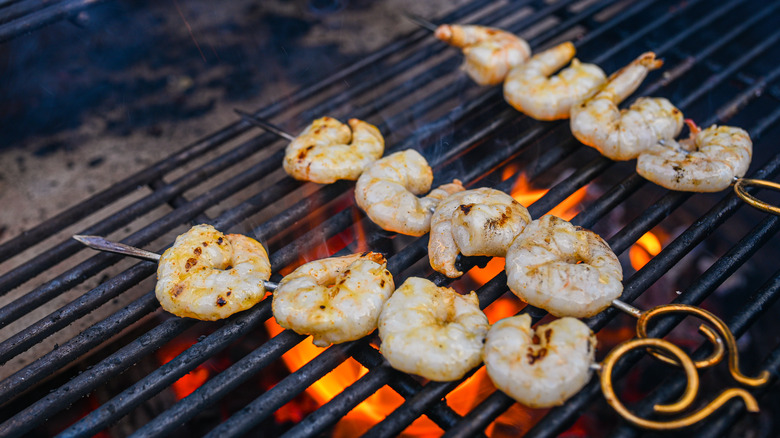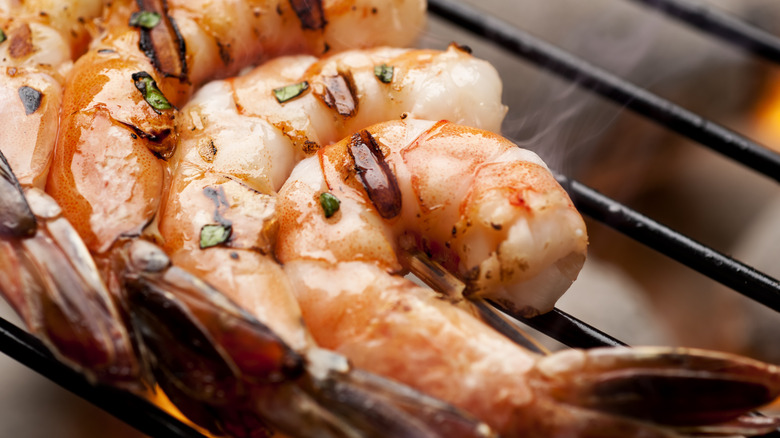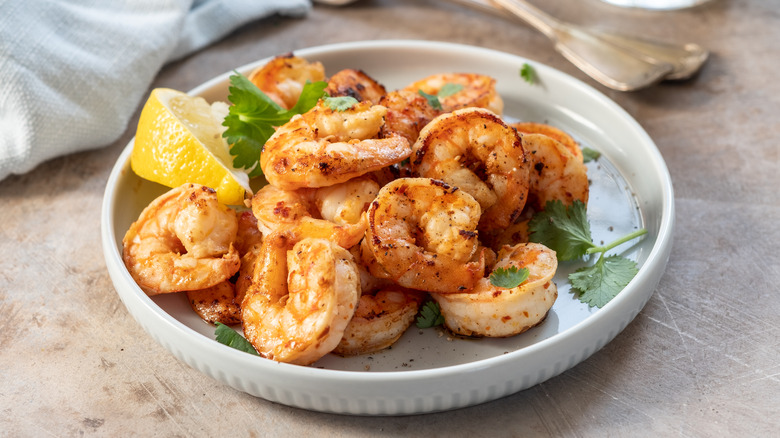The Best And Worst Marinades For Grilling Shrimp
While many varieties of grilled seafood are delicious, there's a beautiful simplicity to shrimp. The shellfish checks many boxes of convenience: It's affordable, easy to prep, and cooks in minutes. Plus, it's easy to enhance its flavor with a simple marinade — the seafood's mild flavor does well with some aromatic infusion. However, you do need to be careful not to use any ingredients that might overwhelm or clash with your crustaceans. Thankfully, we have Jonathan Bautista, executive chef at Carlsbad, California steakhouse Ember & Rye to consult for some pointers.
For the best marinade, he employs a tried-and-true formula. "I usually use a vinaigrette-type marinade for seafood, typically with a 1 to 3 ratio of acid to oil," he notes. From such a framework, there's a lot of potential for variation, like combining lemon juice and olive oil or butter and red wine vinegar.
On the opposite end of the spectrum, Bautista cautions, "I tend to avoid marinades that are overly acidic or sweet," for fear they might damage the shrimp. Make one that's excessively sweet and "the sugars can burn quickly on the grill," he says. Meanwhile, he warns that with marinades containing an overabundance of citrus juice or vinegar, "the seafood can start to cure like ceviche." So, take note of his guidance, and your shrimp will be marinated to perfection.
The importance of fat in shrimp marinades
Whether you're whipping up some grilled shrimp tacos or simply searing a few skewers for a salad, it's handy to consider the functions of the marinade in addition to its flavor. The fat component is especially notable for how it; shrimp is an especially lean protein. Not only does it bring some additional moisture to your grilling, but Jonathan Bautista points out that, crucially, "the oil acts as a barrier, preventing the salt or acid in the marinade from cooking or curing the seafood." No surprise, then, that this the marinade's most prominent ingredient.
Additionally, the oil will help prevent your shrimp from sticking to the grill — a common issue with the food. You'll also want to clean your grates thoroughly between each round to further remedy the issue. And finally, don't neglect the fact that fat is a delicious source of flavor, too. Besides dependable options like olive oil and butter, you can also reach for dairy fat like sour cream and yogurt, as well as avocado oil for a twist to your shrimp marinade.
Make sure to keep your acid levels in check
The other part to Jonathan Bautista's marinade formula is the acidic ingredients — and you'll want to proceed with caution when incorporating them. The chef invokes comparisons to ceviche due to the mechanics of a majorly acidic marinade. If you add too much citrus or vinegar into the mix, it'll make your pH so low that the proteins in the shellfish will denature. This causes them to firm up and changes their appearance, making them closer to cooked shrimp than raw.
As a result, this will interfere with your grilling intention, modifying the texture of the flesh prior to fire. Similarly, in addition to keeping your acid ratio light, make sure to not let the marinating run on too long. "Marinades should be added one to two hours prior to cooking," Chef Bautista advises.
Keep it minimal, and the acid's tenderizing qualities will be beneficial. Better still, in addition to amplifying the crustaceans with a bright and zesty taste, the citrus in your marinade plays another important flavor role, too: It eliminates the fishy taste of shrimp. To that end, consider riffing on something like a simple salmoriglio marinade. Just make sure it's balanced and let your marinated grilled shrimp shine.


